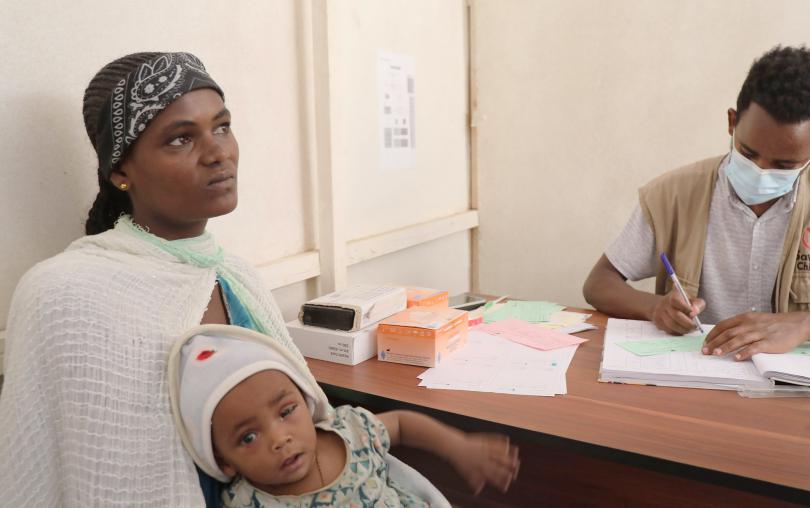I felt Helpless because I could not care for my child: Abrehet’s Story

Story summary
Abrehet*, a 30-year-old mother of one child, used to live in Humera before the outbreak of the second round of conflict in northern Ethiopia in 2022. She and her family were displaced to Adwa, where they began living in one of the most deprived internally displaced persons (IDP) centers in the entire Central zone of the Tigray region. Previously, this had been a high school and center of excellence for thousands of students.
It was at the start of the second round of conflict (2022) that Abrehet married her husband, in effect exiling to Adwa due to the conflict. The newlyweds left their new home with nothing, seeking only to save their lives from the expanding conflict in their neighborhoods. Unaware that she was pregnant and hoping to return soon, Abrehet began her new life in the internally displaced persons (IDP) camp. There she gave birth to her first daughter.
Days turned to months, and months to years, with the swift passage of time, yet nothing changed in Abrehet's life—rather, it only worsened. Above all, Abrehet and her family, like their neighbors, could not withstand the hunger and deprivation that had plagued them since arriving at the IDP camp. She recalls the last time she received food aid, some eight months prior.
We met with Abrehet at a mobile health clinic in the IDP camp, where she had brought her nine-month-old daughter for treatment of Trachoma, an eye disease caused by lack of sanitation, which her daughter had contracted. Additionally, her daughter was found to be moderately malnourished upon examination.
With funding support from the USAID Bureau for Humanitarian Assistance (USAID-BHA), Save the Children has been providing full medical services for IDPs. However, patient data reveals that the numbers of patients presenting with Trachoma and other communicable diseases is rising over time—especially among children, where Trachoma cases are worsening. Despite Save the Children's commitment to health services, patient numbers appear to be rising alarmingly and will likely continue to do so unless a well-planned rehabilitation effort is undertaken for camp residents. The number of displaced people far exceeds the camp's capacity, with overcrowding, lack of clean water and adequate sanitation facilities, and insufficient toilets compounding the IDPs' hardship and suffering.

Abrehet's story in her own words (Quotes)
"My name is Abrehet. I used to live and got married in Humera. Me and my husband left our new home not even contemplating the real flavor of being bride and groom".
"You know, things have been really tough around here lately. We have completely dependent on help from the government and others just to get by each day since there isn't any work available".
"As a parent, it is so hard to see my child struggling. I know she needs proper nutrition and care, but it is difficult to provide that with my current situation. There is just this constant feeling of emptiness and helplessness when I see her health getting worse".
"When I first came to this displacement camp, we at least got clean water delivered once a day. But that stopped for some unknown reason. It is a challenge to get enough water to cook meals at home in addition to the difficulty in keeping personal hygiene".
"I have been feeling sick quite a bit myself lately and it seems like I am always taking the little one to the clinic. Sometimes we do not even have enough food to give her before her medicines. Having an illness in the house while also dealing with hunger, especially with a child, it is just too much. It makes a person want to give up on everything".
Background / Project information
With support from USAID-BHA, Save the Children has provided full medical services and treatment to residents of the Adwa IDP camp for the past three consecutive years. Through the mobile health clinic service Save the Children provides, treatment is given to malnourished children via Outpatient Treatment (OTP) and vaccinations, as well as medical treatments with medicines.




